What comes to mind when you hear “Tahiti” or “Bora Bora”?
You probably think of picturesque black sand beaches, lush jungles, and a romantic ambiance.
As you may well know, Tahiti and Bora Bora are some of the world’s most popular vacation spots for beachgoers, surfers, divers, and people who just enjoy the outdoors.
What you probably don’t know, however, is that these islands are part of French Polynesia, an overseas collectivity of France made up of more than 100 islands.
Its five archipelagos, Austral, Gambier, Society, Marquesas, and Tuamoto, are prized worldwide for their coral-covered lagoons and overwater bungalows.
The indigenous people of French Polynesia, known as Tahitians, are known for their warmth, friendliness, and hospitality.
Their family-centered culture ensures that no one in their clan ever goes hungry or goes to sleep without a roof over their head.
Perhaps, you’re thinking of spending a vacation in French Polynesia.
If this is the case, read on for more information about this gorgeous, breathtaking place.
Warnings & Dangers in French Polynesia

OVERALL RISK: LOW
With an incredibly low crime rate, French Polynesia is an extremely safe place for visitors. Of course, petty crimes do occur, but they’re few and far between. Although crimes aren’t an issue, visitors must be aware of the health risks involved. Dengue fever is sometimes rampant, and tourists cannot always rely on medical personnel to arrive on time if they’re located on one of the more remote islands. But French Polynesian hospitals are up-to-par with international standards, meaning patients can expect to receive decent medical treatment. With French Polynesia’s low crime rate and adequate hospitals, it’s a low-risk place when it comes to physical health and safety.

TRANSPORT & TAXIS RISK: LOW
According to reviews on Tripadvisor, taxis in French Polynesia are, for the most part, safe. However, like in most other places, taxis can be quite expensive, costing tourists as much as 3,000 French Polynesian francs (or $28) for one short trip. But the findings above indicate that the overall transport and taxis risk is very low.

PICKPOCKETS RISK: LOW
Minus the odd pickpocket and the occasional robbery, the pickpocket's risk in French Polynesia is quite low. That being said, if you’re staying in a pricier hotel and have valuable possessions with you, you’d probably be best served by keeping your belongings in a hotel safe. Also, avoid leaving anything of value inside a rental car. Although pickpockets are very rare on the islands, that doesn’t mean you’re completely immune to theft or robbery.

NATURAL DISASTERS RISK: LOW
Located in an active earthquake zone, French Polynesia is also prone to tropical storms, such as cyclones, from November to April. But casualties related to natural disasters are notably rare, so it can be concluded that the islands have a low-to-medium natural disasters risk.

MUGGING RISK: LOW
Although a few reports of theft can be found on Travel Advisor, mugging isn’t a particularly common occurrence on the islands. But, despite the low mugging risk, the possibility of mugging is present everywhere in the world, so you should always practice caution when vacationing in French Polynesia.

TERRORISM RISK: LOW
According to the UK government, “there is no recent history of terrorism in French Polynesia,” but that doesn’t mean you shouldn’t be cautious. Threats of terrorist attacks against UK and US nationals, in particular, have long been an issue worldwide, so American and British visitors should always stay vigilant and aware of their surroundings. Given the UK government’s update, French Polynesia has a low terrorism risk.

SCAMS RISK: LOW
Some people say that because French Polynesia is already very expensive, most people there don’t feel the need to overcharge visitors. Thus, no serious scams have been reported on the islands. Although someone on Quora did claim to receive a suspicious call from French Polynesia once, the risk of scams on the islands is currently quite low and not a major cause for concern.

WOMEN TRAVELERS RISK: LOW
In the past, walking alone as a woman on a deserted beach in French Polynesia was seen as an invitation for sex. But nowadays, with a low women's travelers risk, women can travel to the islands solo with little concern for their safety. But no traveler is completely safe no matter where they are, so discretion is key.

TAP WATER RISK: LOW
In Tahiti, Bora Bora, and Moorea, as well as all the international resorts throughout French Polynesia, tap water is safe to drink. It’s usually safe to drink on the other islands as well, but you should confirm with the hotel or restaurant hosts first just in case. On some of the islands made of coral (known as atolls), tap water may taste somewhat salty, but that doesn’t mean it’s unsafe to drink. Overall, the tap water risk in French Polynesia is low.
Safest Places to Visit in French Polynesia
Nearly all the islands in French Polynesia are safe for tourists.
However, the two most visited islands are Bora Bora and Tahiti.
These places offer plenty of opportunities for snorkeling, jet skiing, scuba diving, walking tours, nature and wildlife adventures, and even yoga.
If you prefer going off the beaten path, you can go to more secluded places like Moorea, Rangiroa, Raiatea, and Taha’a, enjoying the same activities that can be found on the larger, more popular islands, but without the massive crowds.
Some of the most popular French Polynesian dishes include Pura toro (a variety of canned corned beef), Pahua taioro (a Tahitian delicacy based on turbot snails or clams), and poulet fafa (which is also known as “Polynesian spinach”).
Whatever island(s) you choose to visit and whatever activities you decide to do, you’re bound to get the sunny, paradise-like experience you’ve been dreaming of.
Places to Avoid in French Polynesia
French Polynesia, as a whole, is a safe place to vacation.
Crimes are infrequent, but when they do happen, they usually take place in Papeete, the capital.
If you happen to be in Papeete in the evening, you should avoid wearing expensive jewelry, carrying large amounts of cash, or getting into confrontations with others.
But crimes in Papeete are typically petty, and violent crimes are an extreme rarity.
The worst crime a tourist would most likely fall victim to would be pickpocketing.
Once you leave the city, crimes against tourists are almost non-existent, but you should still be careful since no person is 100% safe no matter where they are in the world.
Safety Tips for Traveling to French Polynesia
- Be up-to-date on vaccinations. There are no major health risks when traveling to French Polynesia, but it would be wise to have your tetanus, hepatitis-A, and hepatitis-B shots before embarking on your trip. If you’re fully vaccinated for COVID-19, you can enter the islands without having to present a reason or needing to quarantine. Otherwise, you have to provide a Boarding Authorization Certificate and undergo a mandatory 10-day quarantine upon arrival.
- Pack prescription medications. Keep them in their original containers, or else airport security won’t let you bring them with you. Be sure to bring copies of your prescriptions too in case your pills are lost or they run out.
- Wear sunglasses. Receiving about 2,500 to 2,900 hours of sunshine every year, French Polynesia gives visitors an ample amount of vitamin D. It also exposes them to ultraviolet (UV) light, which can be harmful to their eyes if there’s too much. Therefore, to protect your eyes it’s important to wear sunglasses.
- Use sunscreen. Similarly, sunscreen protects you from excessive ultraviolet rays, which can be detrimental to the health of your skin. Even when it’s cloudy, your skin is vulnerable to the sun’s harmful rays, so be sure to lather up.
- Know where to find medical help. The main public hospitals in French Polynesia meet international standards, so you can receive decent quality medical services for non-serious ailments. For more serious medical issues, you might be evacuated to Tahiti (where most of their medications are from France).
- Carry insect repellent. Insects, such as mosquitos and flies, are prevalent in French Polynesia, so to keep them at bay you need to invest in a good insect repellent. Although currently not a serious issue, there have been cases of dengue fever on the islands. Therefore, it’s essential to bring insect repellent.
- Be careful what you wear in the water. There’s usually nothing to worry about when swimming in the ocean since most of French Polynesia’s marine animals are harmless to humans. But because sharks tend to be attracted to bright, shiny objects, such as watches, be mindful of what you wear in the water.
- Don’t keep valuable items in your hotel room. Theft may be a rare phenomenon in French Polynesia, but it’s always a good idea to keep your items in a hotel safe, especially if those possessions are of value.
- Hike in designated areas only. The hiking areas on the islands were designated for a reason, e.g., to reduce trail maintenance costs, to keep you from getting lost, to prevent soil displacement, so stick to them. Also, be on the lookout for sudden storms, as they can appear when you least expect them.
- Know the COVID-19 regulations. Although French Polynesia allows both vaccinated and unvaccinated travelers to enter (as long as the latter provides a Boarding Authorization Certificate), the US State Department has issued a Level 4 Travel Advisory against traveling to the islands due to the virus. If you’re from the US, you can stay up-to-date on travel advisories for US citizens and permanent residents by checking the US State Department’s website.
So... How Safe Is French Polynesia Really?
All things considered, French Polynesia is an extraordinarily safe place for tourists to visit.
With low crime rates, decent medical services, reliable transportation, and clean drinking water, tourists can rest assured that they’ll be safe on the islands.
When crimes do occur, they’re usually limited to Papeete, French Polynesia’s capital.
And even then, the criminal acts are mostly petty and very rarely violent.
Once tourists are outside the capital, crimes against tourists rarely happen.
Due to the COVID-19 pandemic, there’s currently a US State Department Level 4 Travel Advisory against traveling to French Polynesia.
But US citizens and permanent residents can travel to the islands if they choose to do so.
As long as they practice safety measures, they should be able to travel without too much concern for their safety.
How Does French Polynesia Compare?
| Country | Safety Index |
|---|---|
| French Polynesia | 92 |
| Morocco | 54 |
| Germany | 85 |
| Romania | 80 |
| Namibia | 71 |
| Netherlands | 75 |
| Chile | 79 |
| Mongolia | 71 |
| Qatar | 84 |
Useful Information

Visas
American tourists don’t need a visa for stays in French Polynesia for up to 90 days. For those traveling to the islands for non-tourism reasons (business, scientific research, etc.) on the other hand, a visa may be required.

Currency
The main currency is the French Polynesian franc (CFP). Since only the local currency is accepted, you must exchange your currency at a bank, an ATM, or the airport as soon as you arrive. You can even have your currency exchanged at the departure airport (e.g., in the US) if you prefer to prepare well ahead of time.

Weather
The Polynesian latitudes mean year-round summers. This means you should pack lightly, only bringing clothes like shorts, sundresses, T-shirts, Hawaiian shirts, and, of course, bathing suits. Additionally, make sure you’re equipped with sunglasses and sunscreen since chances are you’ll be having a sun-filled vacation.

Airports
Faa'a International Airport, which is also known as Tahiti International Airport, is French Polynesia’s international airport. If you’re staying on an island other than Tahiti, you’ll likely have to take a flight from that airport to your island’s regional airport.

Travel Insurance
Because unexpected situations, such as lost luggage, medical emergencies, and canceled flights, can happen, you can never go wrong by purchasing travel insurance. By buying this type of insurance, you can rest easy during your trip to French Polynesia, knowing you’re protected against significant financial loss.
French Polynesia Weather Averages (Temperatures)
Average High/Low Temperature
| Temperature / Month | Jan | Feb | Mar | Apr | May | Jun | Jul | Aug | Sep | Oct | Nov | Dec |
|---|---|---|---|---|---|---|---|---|---|---|---|---|
| High °C | 31 | 31 | 31 | 31 | 30 | 30 | 29 | 29 | 29 | 30 | 30 | 30 |
| Low °C | 24 | 24 | 24 | 24 | 23 | 22 | 22 | 21 | 22 | 22 | 23 | 24 |
| High °F | 88 | 88 | 88 | 88 | 86 | 86 | 84 | 84 | 84 | 86 | 86 | 86 |
| Low °F | 75 | 75 | 75 | 75 | 73 | 72 | 72 | 70 | 72 | 72 | 73 | 75 |
French Polynesia - Safety by City
| City | Safety Index |
|---|---|
| Bora Bora | 92 |
| Mo’orea | 78 |
| Tahiti | 65 |
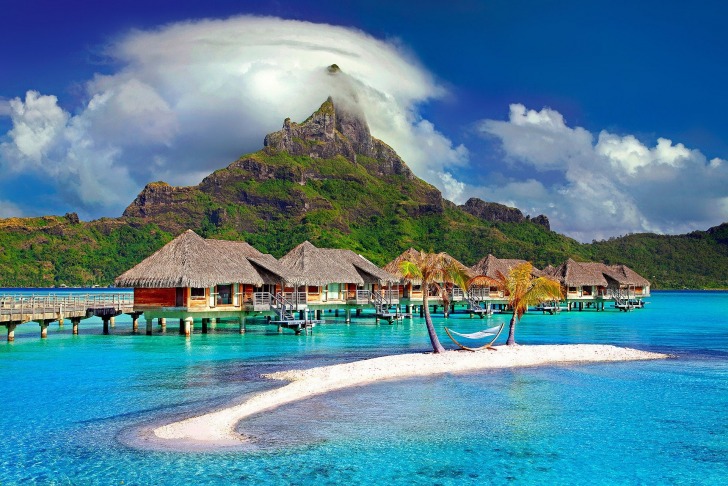
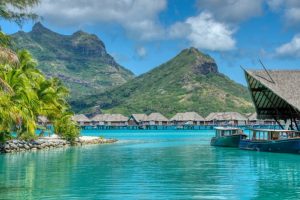

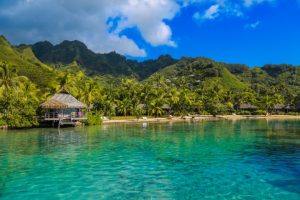
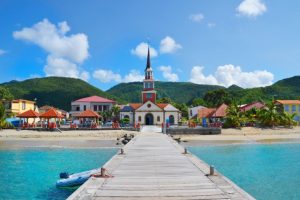

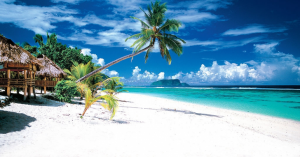





Bucket List
Ahhhh- Someday, someday…..😎🐚🕶️🩴🌴⛵🌏🏖️
beware of the pickpockets…